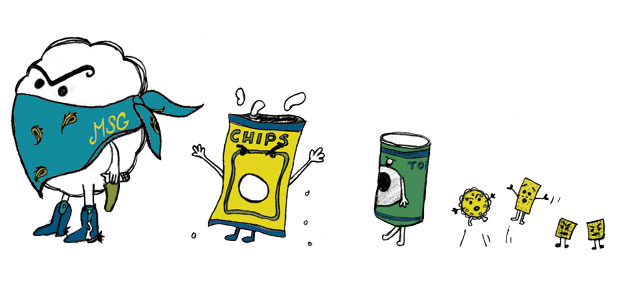Advertisement
It’s an umami!
MSG - love it or leave it?

Many people are familiar with MSG–or monosodium glutamate–as an additive in Asian foods. When asked about whether or not they consume MSG, most would respond that they eat only at establishments that do not add this flavour enhancer to their food.
Why do most people make a point of avoiding this ubiquitous flavour enhancer? Are they truly avoiding it by simply ensuring there is no MSG on their Asian restaurant food?
Controversy has surrounded MSG for decades; because the additive has been associated with some types of Asian food, a set of symptoms related to MSG consumption, first identified in 1968, was called “Chinese-restaurant syndrome.” Since then, this syndrome has been renamed “MSG-symptom complex” to reflect the wide range of effects some people experience and because MSG can be found in many more foods than those served at Asian restaurants.
What Exactly is MSG?
Monosodium glutamate is the sodium salt of glutamic acid, an amino acid present in all protein. MSG is manufactured by fermentation of products such as molasses derived from sugar cane or sugar beets, and starch from tapioca or cereals, and appears as fine, white crystals.
MSG was discovered in 1908 by a Japanese scientist, Kikunae Ikeda, who identified glutamate as the source of a specific delicious, savoury taste, which he named umami. He isolated some crystals from a large amount of kombu (seaweed) broth, a traditional Japanese flavouring, and realized it would be useful as an enhancement to other foods.
Glutamate is a natural part of protein-containing foods such as meat, vegetables, poultry, and milk. It is found in two forms: bound glutamate, which is linked to protein, and free glutamate, which is not linked to protein. Only free glutamate improves the flavour of food. It is the naturally occurring free glutamate in Parmesan cheese, ripe tomatoes, and mushrooms that gives these foods their distinctive flavour.
MSG Promoters
The Glutamate Association, established in 1977, is an association ofmanufacturers, national marketers, and processed food users of glutamic acid and its salts, principally the flavour enhancer MSG. Among the association’s members are many of the world’s largest food companies involved in the manufacturing and marketing of food ingredients; spice and flavour blends; and canned, frozen, and other packaged prepared foods.
The Glutamate Association claims that MSG is safe based on regulatory approval of the FDA, the World Health Organization, the European Communities Scientific Committee for Food, and endorsement by the American Medical Association.
MSG Detractors
A Chicago-based group called Truth in Labeling (truthinlabeling.org) claims that while naturally derived free glutamate has no toxic effects, synthetically produced glutamate contains toxic impurities. More alarmingly, they connect MSG to the spread of obesity and increased incidence of neurological disorders. Their group is involved in an ongoing campaign to enforce better labelling of food products, which enables consumers to recognize MSG and other additives that may indicate the presence of glutamate.
The Truth in Labeling Campaign relies extensively on the research of Dr. Russell Blaylock, a board-certified neurosurgeon in the US who describes MSG as an excitotoxin (a substance that overexcites neurons in the brain to the point of cell death), which causes lesions (injuries) on the hypothalamus.
Lesions on the hypothalamus are linked with abnormal development, including obesity, short stature, and reproductive problems.
Carol Hoernlein, the principal writer for MSGTruth.org and former food process engineer and food scientist, links glutamate to obesity and type 2 diabetes. She claims that higher levels of glutamate in the blood can cause an increase in insulin levels that triggers hunger, and that continued exposure to high insulin levels leads to insulin resistance and type 2 diabetes.
How to Avoid MSG
When shopping for groceries, read labels carefully to determine if a food contains MSG. The more processed a food is, the more likely it is to contain some form of added MSG.
Being aware and informed about the possible consequences of consuming MSG may help us to avoid short-term and possibly even long-term health problems. The best way to avoid MSG is to buy fresh, unprocessed foods at health food stores, organic food markets, and local farmers’ markets.
MSG-Symptom Complex
A report for the FDA by the Federation of American Societies for Experimental Biology (FASEB) identified two groups of people who may develop a condition they describe as “MSG-symptom complex”: those who may be intolerant to MSG when eaten in a large quantity, and people with severe, poorly controlled asthma.
The FASEB report contained a list of symptoms related to MSG-symptom complex:
- burning sensation in the back of the neck, forearms, and chest
- tingling, warmth, and weakness in the face, temples, upper back, neck, and arms
- bronchospasm (difficulty breathing) in MSG-intolerant people with asthma
- numbness in the back of the neck, radiating to the arms and back
- facial pressure or tightness
- chest pain
- headache
- weakness
- nausea
- rapid heartbeat
- drowsiness
Source: FDA Backgrounder, August 31, 1995: “FDA and Monosodium Glutamate (MSG)”
MSG–By Any Other Name
Read labels and look for the following ingredients, which may indicate the presence of MSG:
- ancoma
- autolyzed yeast extract
- L-glutamic acid, monosodium salt
- D02280
- disodium guanylate or inosinate
- DL-monosodium glutamate
- hydrolyzed soy protein
- hydrolyzed vegetable protein
- hydrolyzed yeast
- monoammonium glutamate
- monohydrate
- monopotassium glutamate
- monosodium glutamate (NF)
- monosodium glutamatemonohydrate
- MSG monohydrate
- protein isolates
- sodium glutamate
- sodium glutamate monohydrate
- sodium hydrogen glutamate
- soy extracts
- whey protein
Foods That Commonly Contain Added MSG:
- flavoured potato chips
- frozen meals
- canned soups and vegetables
- crackers
- cookies
- salad dressings
- condiments
- processed meats




